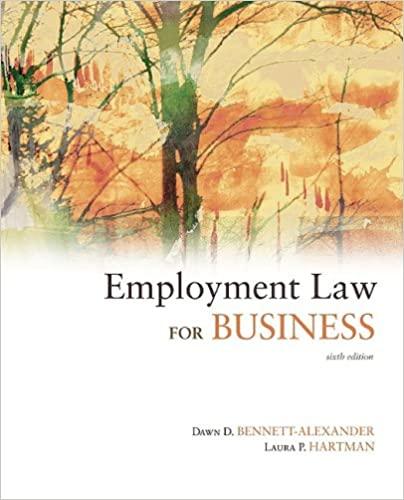Question
Law 101 Teacher: Professor Susan Akram Boston University https://www.bu.edu/academics/policies/academic-conduct-code/ SLEEPWALKER IS ACQUITTED OF MURDER In the early hours of May 24, 1987, Kenneth Parks got
Law 101
Teacher: Professor Susan Akram
Boston University
https://www.bu.edu/academics/policies/academic-conduct-code/
SLEEPWALKER IS ACQUITTED OF MURDER
In the early hours of May 24, 1987, Kenneth Parks got out of bed, drove his car 23 kilometres from his home in Pickering, ON to that of his in-laws in Scarborough, and stabbed his mother-in-law to death and seriously injured his father-in-law.
He was asleep the whole time.
Parks was 23 at the time he killed Barbara Ann Woods and injured Denis Woods. He stabbed them with a kitchen knife while they were in bed, after which he drove to a nearby police station and said: "I just killed someone with my bare hands; oh my God, I just killed someone... I've killed my mother- and father-in-law. I stabbed and beat them to death. It's all my fault."
He was acquitted of murder following his defence of automatism, or sleepwalking, in which a person does things unknowingly and involuntarily, and hence without having formed the intent to commit the crime.
The Crown appealed the jury's verdict because it wanted Parks found innocent, if at all, by reason of temporary insanity, a decision which would have been followed by a period of mandatory incarceration and treatment. When the Ontario Court of Appeal upheld the verdict, the Crown appealed to the Supreme Court of Canada.
Chief Justice Antonio Lamer noted in his reasons for judgment, in which the court upheld Park's acquittal, that the man had always been a deep sleeper and had difficulty waking up. Additionally, he was stressed in the preceding year by a financial mess: he had lost money on horse races, and he subsequently stole $30,000 from his employer who then fired him. He faced court proceedings in the wake of that theft.
Justice Lamer wrote that Parks, who got on well with both in-laws, came from a family where sleepwalking, sleeptalking and nightmares were commonplace.
The trial judge's decision to put only the defence of automatism to the jury, but not insanity, was upheld by the appeal court. Appeal court Justice Galligan concluded that a "disease of the mind" within the meaning of the Criminal Code required that it be caused by illness, disorder or an abnormal condition.
Sleepwalking did not create the state of mind in which the defendant found himself at the time of the murder. Sleep created that state of mind, and sleep, the court said, is a normal condition.
Black's Law Dictionary defines automatism, in part, as behaviour occurring without "will, purpose or reasoned intention" on the part of the somnambulist. But it is a non-insane condition.
The defence called five doctors trained in sleep disorders, and all of them described Parks' actions as those of the classic sleepwalker.
But protection of the public is one of the principal roles of the courts. Would Parks likely commit violent acts again while sleepwalking? At least one of the expert witnesses described that risk as "infinitesimal". Sleepwalking can be reduced if individuals prone to it were to reduce stress in their lives, not become over-tired, and avoid violent physical exercise.
"For the defence of insanity to have been put to the jury, together with or instead of a defence of automatism... there would have had to have been in the record evidence tending to show that sleepwalking was the cause of the respondent's state of mind," Justice Lamer said.
The chief judge then suggested that "some minimally intrusive conditions" ought to be set over the acquitted defendant. He suggested the case be sent back to the trial judge so the lower court could consider what might be done, if anything, to remove every doubt that such an action could recur.
But Justices McLachlin and Iacobucci dissented from the view that the lower court should look at some controls over an acquitted defendant. Such actions are taken only on an application by the prosecution, they said, and the Crown did not make one.
- I don't know what is the seven most important facts of the case.
- what is a verdict in the trial?
- why did the crown appealed the trial verdict?
- What was the legal issue that the Supreme Court of Canada had to decide during the appeal?
- If the Crown were successful in its appeal, what would have happened to Parks?
- Why did the court decide that this was not a case of insane automatism?
- Was served in this case?
Step by Step Solution
There are 3 Steps involved in it
Step: 1

Get Instant Access to Expert-Tailored Solutions
See step-by-step solutions with expert insights and AI powered tools for academic success
Step: 2

Step: 3

Ace Your Homework with AI
Get the answers you need in no time with our AI-driven, step-by-step assistance
Get Started


